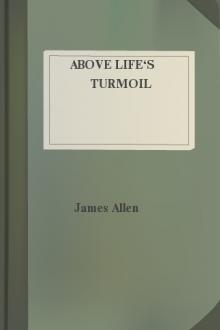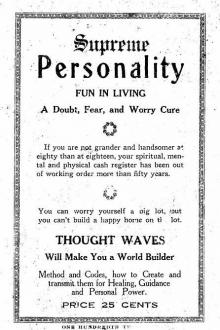Above Life's Turmoil - James Allen (summer reads txt) 📗

- Author: James Allen
- Performer: 1600960979
Book online «Above Life's Turmoil - James Allen (summer reads txt) 📗». Author James Allen
That spiritual perceival who, searching for the Holy Grail of the Perfect Life, is again and again
_”left alone,
And wearying in a land of sand and thorns,“_
is not so stranded because he has followed reason, but because he is still clinging to, and is reluctant to leave, some remnants of his lower nature. He who will use the light of reason as a torch to search for Truth will not be left at last in comfortless darkness.
“Come, now, and let us reason together, saith the Lord; though your sins be as scarlet, they shall be as white as snow.”
Many men and women pass through untold sufferings, and at last die in their sins, because they refuse to reason; because they cling to those dark delusions which even a faint glimmer of the light of reason would dispel; and all must use their reason freely, fully, and faithfully, who would exchange the scarlet robe of sin and suffering for the white garment of blamelessness and peace.
It is because we have proved and know these truths that we exhort men to
_”tread the middle road, whose course
Bright reason traces, and soft quiet
smooths,” _
for reason leads away from passion and selfishness into the quiet ways of sweet persuasion and gentle forgiveness, and he will never be led astray, nor will he follow blind guides, who faithfully adheres to the Apostolic injunction, “Prove all things, and hold fast that which is good.” They, therefore, who despise the light of reason, despise the Light of Truth.
Large numbers of people are possessed of the strange delusion that reason is somehow intimately connected with the denial of the existence of God. This is probably due to the fact that those who try to prove that there is no God usually profess to take their stand upon reason, while those who try to prove the reverse generally profess to take their stand on faith. Such argumentative combatants, however, are frequently governed more by prejudice than either reason or faith, their object being not to find Truth, but to defend and confirm a preconceived opinion.
Reason is concerned, not with ephemeral opinions, but with the established truth of things, and he who is possessed of the faculty of reason in its purity and excellence can never be enslaved by prejudice, and will put from him all preconceived opinions as worthless. He will neither attempt to prove nor disprove, but after balancing extremes and bringing together all apparent contradictions, he will carefully and dispassionately weigh and consider them, and so arrive at Truth.
Reason is, in reality, associated with all that is pure and gentle, moderate and just. It is said of a violent man that he is “unreasonable,” of a kind and considerate man that he is “reasonable,” and of an insane man that he has “lost his reason.” Thus it is seen that the word is used, even to a great extent unconsciously, though none the less truly, in a very comprehensive sense, and though reason is not actually love and thoughtfulness and gentleness and sanity, it leads to and is intimately connected with these divine qualities, and cannot, except for purposes of analysis, be dissociated from them.
Reason represents all that is high and noble in man. It distinguishes him from the brute which blindly follows its animal inclinations, and just in the degree that man disobeys the voice of reason and follows his inclinations does he become brutish. As Milton says:
_”Reason in man obscured, or not obeyed,
Immediately inordinate desires
And upstart passions catch the government
From reason, and to servitude reduce
Man till then free.” _
The following definition of “reason” from Nuttall’s Dictionary will give some idea of the comprehensiveness of the word:
The cause, ground, principle, or motive of anything said or done; efficient cause; final cause; the faculty of intelligence in man; especially the faculty by which we arrive at necessary truth. It will thus be seen that “reason” is a term, the breadth of which is almost sufficient to embrace even Truth itself, and Archbishop Trench tells us in his celebrated work On the Study of Words that the terms Reason and Word “are indeed so essentially one and the same that the Greek language has one word for them both,” so that the Word of God is the Reason of God; and one of the renderings of Lao-tze’s “Tao” is Reason, so that in the chinese translation of our New Testament, St.John’s Gospel runs; “In the beginning was the Tao.”
To the undeveloped and uncharitable mind all words have narrow applications, but as a man enlarges his sympathies and broadens his intelligence, words become filled with rich meanings and assume comprehensive proportions. Let us therefore cease from foolish quarrelings about words, and, like reasonable beings, search for principles and practise those things which make for unity and peace.
Self-Discipline
A man does not live until he begins to discipline himself; he merely exists. Like an animal he gratifies his desires and pursues his inclinations just where they may lead him. He is happy as a beast is happy, because he is not conscious of what he is depriving himself; he suffers as the beast suffers, because he does not know the way out of suffering. He does not intelligently reflect upon life, and lives in a series of sensations, longings, and confused memories which are unrelated to any central idea or principle. A man whose inner life is so ungoverned and chaotic must necessarily manifest this confusion in the visible conditions of his outer life in the world; and though for a time, running with the stream of his desires, he may draw to himself a more or less large share of the outer necessities and comforts of life, he never achieves any real success nor accomplishes any real good, and sooner or later wordly failure and disaster are inevitable, as the direct result of the inward failure to properly adjust and regulate those mental forces which make the outer life.
Before a man accomplish anything of an enduring nature in the world he must first of all acquire some measure of success in the management of his own mind. This is as mathematical a truism as that two and two are four, for, “out of the heart are the issues of life.” If a man cannot govern the forces within himself, he cannot hold a firm hand upon the outer activities which form his visible life. On the other hand, as a man succeeds, in governing himself he rises to higher and higher levels of power and usefulness and success in the world.
The only difference between the life of the beast and that of the undisciplined man is that the man has a wider variety of desires, and experiences a greater intensity of suffering. It may be said of such a man that he is dead, being truly dead to self-control, chastity, fortitude, and all the nobler qualities which constitute life. In the consciousness of such a man the crucified Christ lies entombed, awaiting that resurrection which shall revivify the mortal sufferer, and wake him up to a knowledge of tha realities of his existence.
With the practice of self-discipline a man begins to live, for he then commences to rise above the inward confusion and to adjust his conduct to a steadfast centre within himself. He ceases to follow where inclination leads him, reins in the steed of his desires, and lives in accordance with the dictates of reason and wisdom. Hitherto his life has been without purpose or meaning, but now he begins to consciously mould his own destiny; he is “clothed and in his right mind.”
In the process of self-discipline there are three stages namely;
Control
Purification
Relinquishment
A man begins to discipline himself by controlling those passions which have hitherto controlled him; he resists temptation and guards himself against all those tendencies to selfish gratifications which are so easy and natural, and which have formerly dominated him. He brings his appetite into subjection, and begins to eat as a reasonable and responsible being, practising moderation and thoughtfulness in the selection of his food, with the object of making his body a pure instrument through which he may live and act as becomes a man, and no longer degarding that body by pandering to gustatory pleasure. He puts a check upon his tongue, his temper, and, in fact, his every animal desire and tendency, and this he does by referring all his acts to a fixed centre within himself. It is a process of living from within outward, instead of, as formerly, from without inward. He conceives of an ideal, and, enshrining that ideal in the sacred recesses of his heart, he regulates his conduct in accordance with its exaction and demands.
There is a philosophical hypothesis that at the heart of every atom and every aggregation of atoms in the universe there is a motionless center which is the sustaining source of all the universal activities. Be this as it may, there is certainly in the heart of every man and woman a selfless centre without which the outer man could not be, and the ignoring of which leads to suffering and confusion. This selfless center which takes the form, in the mind, of an ideal of unselfishness and spotless purity, the attainment of which is desirable, is man’s eternal refuge from the storms of passion and all the conflicting elements of his lower nature. It is the Rock of Ages, the Christ within, the divine and immortal in all men.
As a man practises self-control he approximates more and more to this inward reality, and is less and less swayed by passion and grief, pleasure and pain, and lives a steadfast and virtuous life, manifesting manly strength and fortitude. The restraining of the passions, however, is merely the initial stage in self-discipline, and is immediately followed by the process of Purification. By this a man so purifies himself as to take passion out of the heart and mind altogether; not merely restraining it when it rises within him, but preventing it from rising altogether. By merely restraining his passions a man can never arrive at peace, can never actualise his ideal; he must purify those passions.
It is in the purification of his lower nature that a man becomes strong and god-like, standing firmly upon the ideal centre within, and rendering all temptations powerless and ineffectual. This purification is effected by thoughtful care, earnest meditation, and holy aspiration; and as success is achieved confusion of mind and life pass away, and calmness of mind and spiritualized conduct ensure.
True strength and power and usefulness are born of self-purification, for the lower animal forces are not lost, but are transmuted into intellectual and spiritual energy. The pure life (Pure in thought and deed) is a life of conservation of energy; the impure life (even should the impurity not extent beyond thought) is a life of dissipation of energy. The pure man is more capable, and therefore more fit to succeed in his plans and to accomplish his purposes than the impure. Where the impure man fails, the pure man will step in and be victorious, because he directs his energies with a calmer mind and a greater definiteness and strength of purpose.
With the growth in purity; all the elements which constitute a strong and virtuous manhood are developed in an increasing degree of power, and as a man brings his lower nature into subjection, and makes his passions do his bidding,





Comments (0)